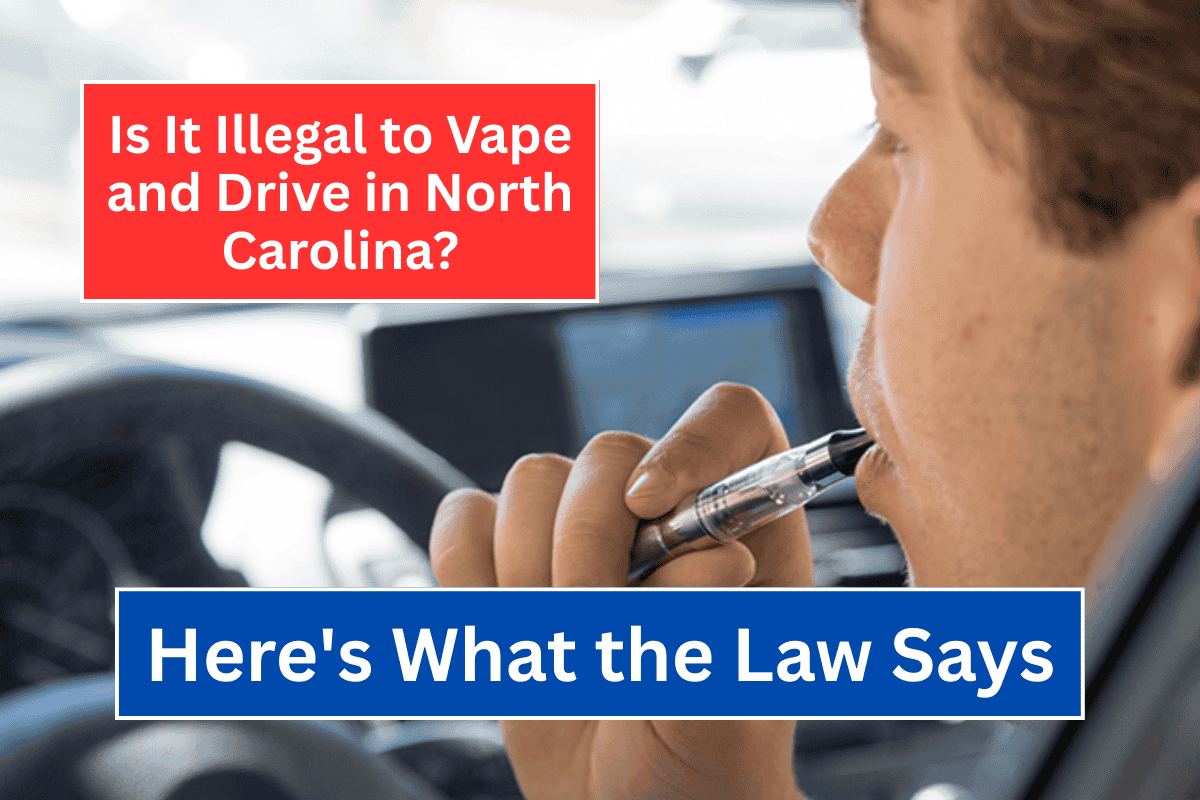Vaping and driving in North Carolina is not illegal on its own, but the state’s laws on vaping and tobacco products are strict. This includes rules on how products are sold, who can buy them, and where they can be used.
North Carolina has implemented various local and state-level regulations to control the sale and use of vaping products. In this article, we’ll take a closer look at the vaping laws in North Carolina, including recent changes, regulations for sellers, and local ordinances.
Federal vs. State Regulations on Vaping
Vaping products are regulated both at the federal and state levels in the United States. On the federal level, the U.S. Food and Drug Administration (FDA) enforces regulations on the sale of e-cigarettes, vaping products, and other tobacco-related goods.
For example, the FDA has cracked down on retailers selling vaping products without proper authorization. At the federal level, only closed-system vaping devices (like pods and cartridges) can have tobacco or menthol flavors, and manufacturers must get FDA approval for these products. North Carolina also enforces these federal regulations.
One significant change in the law is the legal age for purchasing vaping products. Federally, the legal age is 18, but North Carolina recently raised the legal age to 21 for buying and using tobacco products, including vapes. This age restriction is one of many changes in North Carolina’s vaping laws.
Do You Need a License to Sell Vapes in North Carolina?
Yes, retailers and wholesalers in North Carolina must have a license to sell vaping products. This includes disposable vapes, e-cigarettes, and other related items. Since July 2024, businesses need to register with the Secretary of State to legally sell vaping products in the state.
Online sellers are also required to meet the same licensing and reporting requirements as physical retailers. This ensures that taxes are properly collected and remitted to the state.
Recent Legislative Changes Regarding Vaping
In June 2024, North Carolina passed an amendment known as House Bill 900. This law allows adults aged 18 and older to purchase nicotine products after verifying their age through an official ID like a driver’s license. However, a new proposal, Solly’s Law, aims to increase the minimum age for nicotine use from 18 to 21.
Another important change is related to taxes. Vapor products now carry a tax of $0.05 per milliliter of e-liquid. Additionally, e-liquids must be sold in child-resistant packaging with clear nicotine warnings. The state also requires manufacturers to submit certifications and pay annual fees to stay compliant with federal regulations.
Local Ordinances Impacting Vape Businesses
Local governments in North Carolina have also passed regulations that impact vape businesses. For instance:
New Hanover County (2021): Banned vaping in public spaces like restaurants and bars to protect youth from tobacco products.
Wake County (2023): Passed an ordinance to prevent vape shops from opening within 1000 feet of schools, parks, or homes.
Whiteville (2024): Enacted a law that restricts vape shops from operating near schools, daycare centers, and other public areas.
Carteret County (2024): Increased the legal age for vaping from 18 to 21, aligning with federal standards.
These local laws aim to protect public health, particularly the health of minors, by restricting where vaping products can be sold and used.
Manufacturing and Marketing Restrictions
Manufacturers of vaping products must also comply with strict rules. Under HB 900, manufacturers must certify their products and pay a fee to be listed in North Carolina’s product directory. They must also submit a timely premarket tobacco application (PMTA) to the FDA. Failure to comply can result in fines or charges.
Additionally, vaping companies are required to follow rules for marketing their products. In 2021, JUUL, a leading e-cigarette company, settled a lawsuit with the state over allegations of marketing to minors.
As of June 2024, online retailers must verify the age of their customers before making sales, and they must include health warnings in their advertisements.
Import and Export Laws for Vaping Products
Manufacturers outside North Carolina must also follow specific rules if they want to sell their products in the state. They must submit electronic verification forms to the state and maintain an agent in North Carolina. Foreign manufacturers must ensure that their products are registered and comply with North Carolina’s regulations.
Compliance Requirements for Vape Businesses
Vape businesses must meet several compliance requirements to operate legally in North Carolina. These include:
Age Verification: Retailers must verify the age of their customers through third-party services.
Product Certification: All vape products must be certified before they can be sold in the state.
Location Restrictions: Vaping is prohibited in certain areas, including schools, childcare centers, and some public parks.
Retailer Permitting: Only licensed retailers will be authorized to sell vaping products, starting in May 2025.
Penalties for Non-Compliance
Businesses that fail to comply with vaping regulations in North Carolina face significant penalties. Fines can range from $500 to $1000 for the first violation, and the penalties increase for repeat offenses. In some cases, businesses may even have their permits suspended.
Vaping laws in North Carolina are strict, and businesses must stay updated on the latest regulations. Whether you are a retailer, manufacturer, or consumer, it’s essential to comply with the state and federal laws to avoid penalties.
The vaping industry in North Carolina is likely to undergo more changes in the coming years, with more crackdowns expected on unauthorized products and sales.












